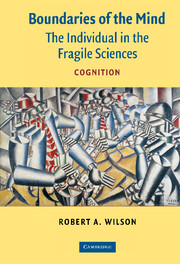Book contents
- Frontmatter
- Contents
- List of Tables and Figures
- Acknowledgments
- Boundaries of the Mind
- PART ONE DISCIPLINING THE INDIVIDUAL AND THE MIND
- PART TWO INDIVIDUALISM AND EXTERNALISM IN THE PHILOSOPHY OF MIND AND THE COGNITIVE SCIENCES
- 4 Individualism: Philosophical Foundations
- 5 Metaphysics, Mind, and Science: Two Views of Realization
- 6 Context-Sensitive Realizations
- 7 Representation, Computation, and Cognitive Science
- PART THREE THINKING THROUGH AND BEYOND THE BODY
- PART FOUR THE COGNITIVE METAPHOR IN THE BIOLOGICAL AND SOCIAL SCIENCES
- Notes
- References
- Index
7 - Representation, Computation, and Cognitive Science
Published online by Cambridge University Press: 02 December 2009
- Frontmatter
- Contents
- List of Tables and Figures
- Acknowledgments
- Boundaries of the Mind
- PART ONE DISCIPLINING THE INDIVIDUAL AND THE MIND
- PART TWO INDIVIDUALISM AND EXTERNALISM IN THE PHILOSOPHY OF MIND AND THE COGNITIVE SCIENCES
- 4 Individualism: Philosophical Foundations
- 5 Metaphysics, Mind, and Science: Two Views of Realization
- 6 Context-Sensitive Realizations
- 7 Representation, Computation, and Cognitive Science
- PART THREE THINKING THROUGH AND BEYOND THE BODY
- PART FOUR THE COGNITIVE METAPHOR IN THE BIOLOGICAL AND SOCIAL SCIENCES
- Notes
- References
- Index
Summary
THE COGNITIVE SCIENCE GESTURE
We saw in Chapter 4 that as individualism was coming under attack in the late 1970s, it was also being defended by Jerry Fodor and Stephen Stich as a view of the mind particularly apt for a genuinely scientific approach to understanding cognition. In contrast to the original externalist papers of Putnam and Burge, those in which methodological solipsism and the principle of autonomy were introduced focused on the relevance of individualism for explanatory practice in cognitive science. They appealed to the computational nature of cognition in arguing that cognitive science should be individualistic, and for substantive conclusions about its scope and methodology.
These early individualist arguments of Stich and Fodor invoked what I shall call the cognitive science gesture. They primarily pointed to general features of cognition and theory in cognitive science that, they claimed, revealed their individualistic nature. Cognition was computational (and computation was individualistic), or cognitive processing was mechanistic (and such mechanisms were individualistic). Neither used a sustained, detailed examination of particular theories and explanations in cognitive science to argue that they were or must be individualistic. Instead, Fodor and Stich were, at least initially, content with a more abstract, general gesture toward features they took to be central to cognitive science.
The gesture toward the developing cognitive sciences in defending individualism served both to motivate and to buttress more purely philosophical considerations in favor of individualism, such as appeals to functionalism, physicalism, and causal powers, and the idea that it was narrow content that was truly explanatory of cognition.
- Type
- Chapter
- Information
- Boundaries of the MindThe Individual in the Fragile Sciences - Cognition, pp. 144 - 180Publisher: Cambridge University PressPrint publication year: 2004



